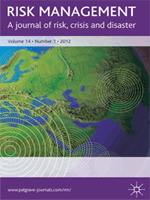
Risk Management-An International Journal
Scope & Guideline
Navigating Uncertainty, Shaping Tomorrow
Introduction
Aims and Scopes
- Enterprise and Operational Risk Management:
The journal emphasizes the importance of enterprise risk management (ERM) frameworks that enhance organizational performance and resilience. This includes studies focusing on the integration of risk management into corporate governance and strategic planning. - Financial Risk Assessment and Management:
A core area of the journal is the analysis of financial risks, including credit, market, and liquidity risks, with methodologies ranging from statistical modeling to machine learning techniques. - Regulatory and Systemic Risk Analysis:
The journal covers the impact of regulatory frameworks on risk management practices, particularly in banking and insurance sectors, examining how these regulations influence systemic risk and overall financial stability. - Sector-Specific Risk Studies:
There is a consistent focus on sector-specific risks, such as those in insurance, banking, and emerging markets, with papers exploring unique challenges and strategies pertinent to these industries. - Technological and Cyber Risk Management:
The journal also delves into the implications of digitalization and technological advancements on risk management, including the assessment of cyber risks and the integration of technology in risk assessment methodologies.
Trending and Emerging
- Machine Learning and Data-Driven Risk Management:
There is a growing trend towards the use of machine learning and advanced data analytics in risk prediction and management, highlighting the journal's commitment to incorporating innovative methodologies in its discourse. - Sustainability and Environmental Risks:
Emerging themes around sustainability, particularly in relation to corporate environmental responsibility and climate risk management, are gaining traction, reflecting a broader societal push towards sustainable practices. - Impact of COVID-19 on Risk Dynamics:
The pandemic has catalyzed research into the effects of COVID-19 on various risk factors, particularly in banking and finance, illustrating the journal's adaptation to global events and their implications on risk management. - Cybersecurity and Digital Risks:
With the increasing reliance on digital technologies, there is a notable rise in research addressing cybersecurity risks and the implications for financial institutions, demonstrating a proactive approach to emerging threats. - Interconnectedness of Global Risks:
The focus on systemic and interconnected risks, particularly in the context of global financial systems and markets, is emerging as a vital area of interest, emphasizing the complexity of modern risk environments.
Declining or Waning
- Traditional Risk Models:
There has been a noticeable decline in papers focused on traditional risk modeling techniques, such as basic statistical approaches and non-complex models, as researchers increasingly adopt more sophisticated methodologies like machine learning. - Generalized Economic Risk Factors:
The exploration of broad economic risk factors, such as general economic downturns without specific context, appears to be waning, with a shift towards more nuanced studies that consider sector-specific or microeconomic influences. - Single-Factor Risk Assessments:
Research focusing on single-factor analysis in risk assessments is declining. The current trend favors more complex, multifactor approaches that consider interdependencies and systemic relationships in risk.
Similar Journals
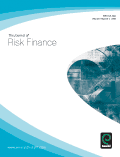
Journal of Risk Finance
Advancing insights in risk management and finance.The Journal of Risk Finance, published by Emerald Group Publishing Ltd, is a premier academic journal dedicated to advancing the understanding of risk management and finance practices since its inception in 1999. With a strong foothold within the Q2 rankings in both Accounting and Finance categories, it proudly holds a significant place in the scholarly landscape, ranking #54 out of 317 in the Scopus Economics and Finance category, placing it in the 83rd percentile. The journal aims to facilitate the exchange of innovative research and practical insights, catering to an audience of researchers, professionals, and students eager to explore contemporary issues in risk finance. While not an open access journal, it provides numerous access options, ensuring that essential findings reach a broad readership. Set in the United Kingdom and covering publications up to 2024, the Journal of Risk Finance continues to be an indispensable resource for those committed to this critical field.
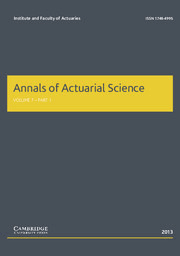
Annals of Actuarial Science
Advancing the frontiers of risk management and data analysis.Annals of Actuarial Science, published by Cambridge University Press, stands as a prominent academic journal in the fields of economics, statistics, and actuarial science. With an ISSN of 1748-4995, it features rigorous research aimed at advancing knowledge and practice in areas related to risk management, data analysis, and probability. The journal is recognized for its significant impact, holding a Q2 category ranking in both Economics and Econometrics and Statistics and Probability, along with notable positioning within Scopus rankings. Although it does not currently offer open access, its comprehensive selection of scholarly articles from 2010 to 2024 remains invaluable to researchers, professionals, and students alike, providing insights that drive the actuarial profession and enhance decision-making processes across various sectors. Positioned at the intersection of theoretical innovation and practical application, the Annals of Actuarial Science continues to shape the discourse and development of its disciplines.

ENGINEERING ECONOMIST
Exploring the Financial Dimensions of InnovationENGINEERING ECONOMIST, published by Taylor & Francis Inc, stands as a revered journal in the intersecting fields of economics, engineering, and education, with an ISSN of 0013-791X and E-ISSN of 1547-2701. Since its inception in 1955, this journal has provided a vital platform for researchers, practitioners, and students to disseminate and engage with novel insights and methodologies impacting the engineering economy. With a robust focus on the quantitative aspects of engineering management and decision-making, ENGINEERING ECONOMIST ranks within the Q3 category in multiple disciplines including Economics and Econometrics, Education, and Miscellaneous Engineering as of 2023, reflecting its significant contributions to the scholarly community. The journal’s Scopus rankings further emphasize its relevance, ranking #778 in Education and #158 in General Engineering. Although the journal does not offer Open Access options, it remains pivotal for advancing the dialogue at the nexus of technology and economics, making it an essential resource for anyone interested in the financial dimensions of engineering innovations.
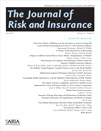
JOURNAL OF RISK AND INSURANCE
Advancing insights in risk management and insurance.JOURNAL OF RISK AND INSURANCE, published by Wiley, stands as a premier platform for advancing knowledge in the fields of risk management and insurance. With an established ISSN of 0022-4367 and an E-ISSN of 1539-6975, this journal is rigorously peer-reviewed, ensuring the highest standards of academic quality. Recognized as a Q1 journal in 2023 across multiple categories such as Accounting, Economics, and Finance, it showcases influential research that addresses complex issues within these domains. The journal is notable for its innovative contributions and is essential reading for researchers, professionals, and students dedicated to understanding the evolving landscape of risk and insurance from 1978 to the present. Although not an Open Access journal, it provides valuable insights for those aiming to enhance their expertise while navigating the intersection of theory and practice.
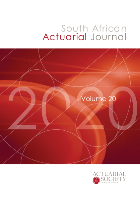
South African Actuarial Journal
Advancing actuarial excellence in South Africa.Welcome to the South African Actuarial Journal, a premier publication dedicated to advancing the field of actuarial science within the South African context and beyond. Published by the Actuarial Society of South Africa (ASSA), this journal serves as a vital platform for researchers, practitioners, and students to disseminate their findings, share innovative methodologies, and discuss contemporary challenges in actuarial practice. With an ISSN of 1680-2179, the journal encompasses a wide range of topics including risk management, insurance, pensions, and financial mathematics, making it an essential resource for those engaged in quantitative risk analysis. Although currently lacking an open access model, the journal's rigorous peer-review process ensures that all published articles maintain a high standard of quality and relevance. Engaging with the South African Actuarial Journal allows readers to stay at the forefront of developments in actuarial science, contributing to the profession's evolution and effectiveness in addressing the complexities of modern risk environments.

Journal of Financial Regulation
Empowering scholars and practitioners in finance.The Journal of Financial Regulation, published by Oxford University Press, serves as a pivotal platform for research and discourse in the field of finance and regulatory frameworks. Since its inception in 2015, this esteemed journal has captured the attention of scholars and practitioners alike, achieving a notable Q2 ranking in the finance category (as of 2023) and securing its place among the top 20% of journals in its field. With a robust focus on contemporary issues surrounding financial regulation and governance, the journal provides valuable insights and comprehensive analyses relevant to both global and local regulatory environments. Although it is not an open access journal, it offers exclusive content that is crucial for advancing knowledge in finance, evidenced by its strong performance with a Scopus rank of #65 out of 317 in the disciplines of Economics, Econometrics, and Finance. Researchers, professionals, and students are encouraged to explore the rich array of articles that contribute to the ongoing conversation in financial regulation, making it an essential resource for anyone engaged in the field.
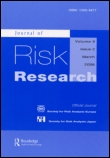
JOURNAL OF RISK RESEARCH
Elevating Understanding of Risk Through Quality ResearchJOURNAL OF RISK RESEARCH, published by Routledge Journals, Taylor & Francis Ltd, is a prestigious academic journal dedicated to advancing the understanding of risk across diverse fields, including engineering, safety, social sciences, and management. With its impact reflected in its Q1 quartile rankings in multiple categories and a solid standing in Scopus rankings, this journal serves as an essential resource for researchers, professionals, and students aiming to explore the complexities of risk analysis and its implications in real-world scenarios. The journal has been consistently publishing high-quality research since 1998, contributing to both theoretical frameworks and practical applications. While not open access, the content of the journal is invaluable for those keen on staying at the forefront of risk research. By addressing the multifaceted nature of risk, including safety, reliability, and strategic management, the JOURNAL OF RISK RESEARCH plays a vital role in shaping contemporary discussions and innovations in risk management and decision-making.
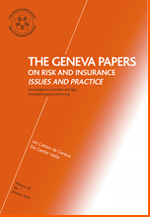
GENEVA PAPERS ON RISK AND INSURANCE-ISSUES AND PRACTICE
Illuminating Key Issues in Risk and InsuranceGENEVA PAPERS ON RISK AND INSURANCE-ISSUES AND PRACTICE is a leading academic journal dedicated to advancing the fields of risk management and insurance, published by the esteemed Palgrave Macmillan Ltd. With an ISSN of 1018-5895 and an E-ISSN of 1468-0440, this journal serves as a pivotal platform for sharing cutting-edge research and practical insights addressing a diverse range of issues within the insurance sector. Established in 1999, it spans a wide array of topics, including risk assessment, financial implications, and policy development, contributing to its recognition in the Q2 quartile across multiple categories such as Accounting and Economics. With a notable Scopus ranking reflecting its relevance—ranked #229/716 in Economics and Econometrics, and #106/317 in Finance—it provides invaluable resources for scholars, professionals, and policymakers alike. Despite being a non-open-access journal, the GENEVA PAPERS ensures a rigorous peer-review process, aiming to uphold the highest standards of scholarly publication. Whether you are a researcher looking to publish groundbreaking studies or a practitioner seeking the latest trends and analyses in the insurance landscape, this journal stands out as an essential resource in the domain.
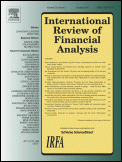
International Review of Financial Analysis
Pioneering high-impact research in finance and economics.The International Review of Financial Analysis, published by Elsevier Science Inc, is a premier journal dedicated to advancing the fields of finance and economics. With an impressive impact factor and ranked in the top quartile (Q1) of both Economics and Econometrics and Finance categories, this journal is recognized for its high-quality research and significant contributions to the discipline. Since its inception in 1992, it has provided a platform for scholars to present innovative theories and empirical studies that address critical financial issues around the globe, making it a vital resource for researchers, professionals, and students alike. Although it does not offer open access, the journal actively engages with contemporary debates in financial analysis, ultimately empowering its readership to contribute to and benefit from the ongoing discourse. With its convergence of financial research and analytical methodologies through 2024, the International Review of Financial Analysis remains a cornerstone in the pursuit of knowledge within the ever-evolving landscape of finance.

Journal of Insurance Issues
Bridging Theory and Application in Risk AssessmentJournal of Insurance Issues, published by the Western Risk & Insurance Association, stands as a pivotal platform for the exploration and dissemination of knowledge in the field of insurance and risk management. With an ISSN of 1531-6076 and an E-ISSN of 2332-4244, this journal delves into the complexities and evolving dynamics of insurance practices, policies, and theoretical underpinnings. Although not an open-access journal, it remains accessible to a broad audience, including academics, practitioners, and students eager to engage with rigorous research and innovative ideas. The journal is dedicated to enhancing understanding in critical areas such as risk assessment, regulatory impacts, insurance economics, and consumer behavior, thereby contributing significantly to the professional discourse within the insurance sector. Its robust editorial standards ensure that published works meet high-quality scholarly criteria, further establishing the journal as an essential resource for anyone interested in the multifaceted world of insurance.